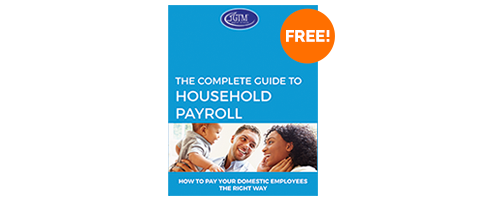Nanny Taxes in New Jersey
Household employers need to comply with tax, wage, and labor laws that affect nannies, in-home senior caregivers, and other household employees. While federal laws cover employers in all states, there are also state- and city-specific regulations that employers must follow. Here’s what you need to know about nanny taxes in New Jersey.
New Jersey Minimum Wage
Household employees must be paid at least the highest of the federal, state, or applicable local minimum wage rates. New Jersey’s state minimum wage rate of $13.73/hour will apply to most household employers. Households with six or more employees have a minimum wage of $15.13/hour.
Overtime
All household employees, including live-in workers, in New Jersey, are required to be paid at least time and a half for hours worked over 40 in a seven-day workweek.
New Jersey State Unemployment Tax & Rate
In New Jersey, the new employer SUI (state unemployment insurance) rate is 3.2825 percent on the first $42,300 of wages for each employee. Employers also pay 0.1175 percent into the Workforce Development/Supplemental Workforce funds for a total rate of 3.40 percent.
New Jersey is one of a few states that require employees to also pay into unemployment. Employees pay 0.3825 percent into unemployment insurance and 0.0425 percent into the Workforce Development/Supplemental Workforce funds on the first $42,300 of their wages.
Also, household employers must provide a post-termination notification to the New Jersey Department of Labor & Workforce Development (NJDOL) when separating from an employee. They must provide Form BC-10 (Instructions for Claiming Unemployment Benefits) immediately to the terminated employee and electronically to the NJDOL. Employers must also submit a new form (yet to be published by the NJDOL) with specific information to enable the NJDOL to make a benefit determination, regardless of whether the separating employee files a claim. Employers must also provide this new form to separated employees.
Workers’ Compensation Insurance
Household employers in New Jersey are required to have workers’ compensation coverage for all part- and full-time employees. In New Jersey, you may be able to add workers’ compensation to your homeowner’s policy. If not, get a quote on workers’ compensation insurance.
New Jersey Domestic Workers’ Bill of Rights
The New Jersey Domestic Workers’ Bill of Rights provides a range of rights and employment protections for household employees, including wage protections, anti-discrimination and anti-harassment rights, health and safety protections, and privacy rights. It will take effect in July 2024.
Learn more about the New Jersey Domestic Workers’ Bill of Rights.
Disability & Family Leave Insurance
Household employees in New Jersey also pay 0.09 percent of taxable wages for family leave insurance (FLI). These rates apply to the first $161,400 in wages.
New employers pay 0.50 percent on the first $42,300 of wages for each employee toward temporary disability insurance (TDI). New employers do not pay into FLI.
Earned Sick Leave
The New Jersey Paid Sick Leave law applies to all employers – including families that hire household help. Household employees can accrue up to 40 hours of paid sick leave at a rate of one hour for every 30 hours worked. While unused sick time must carry over to the next year, it can be capped at 40 hours. An employer can also offer to pay an employee for their unused sick time at the end of the year. However, unused sick time earned but not used doesn’t need to be paid upon separation from employment. Employees start accruing paid leave 120 days after being hired. All full-time, part-time, and temporary employees are covered by the law.
Paid sick leave can be used for:
- Diagnosis, care, treatment of, or recovery from the employee’s own mental or physical illness, injury, or condition including preventive care
- Caring for a family member during the diagnosis, care, treatment of, or recovery from a mental or physical illness, injury, or condition including preventive care
- Time needed because the employee or family member is a victim of domestic or sexual violence. This includes:
- Medical attention is needed to recover from physical or psychological injury or disability caused by domestic or sexual violence
- Services from a designated domestic violence agency or other victim services organization;
- Psychological or other counseling
- Relocation
- Legal services such as obtaining a restraining order or participating in any civil or criminal proceedings related to domestic violence or sexual violence
- Times when the workplace, school, or childcare is closed by order of a public official due to a public health concern.
- Attending a school-related conference, meeting or function requested or required by the school
In addition, employees can use paid sick leave for COVID-19-related reasons including:
- Quarantine based on the advice of a health care provider or public health authority (including the quarantine required when returning to New Jersey from certain states);
- Getting tested for COVID-19;
- Taking care of their children when school or childcare is closed due to an epidemic or public health emergency (including mandatory remote learning during COVID-19)
- Caring for their own, or a loved one’s, physical or mental health or injury, including COVID-19; and
- Getting a COVID-19 vaccine, including travel to and from their appointment and recovery from side effects
Employers must post a notice in a place accessible to workers and provide a written copy of that same notice to their employees.
Learn more about New Jersey State’s Earned Sick Leave.
Pay Frequency
Household employers in New Jersey must schedule a regular payday, and workers must be paid at least twice a month and no more than 10 days after the end of the pay period.
Final Pay
All wages are due to a departing household employee no later than the regular payday for the pay period during which the worker’s termination takes place.
Helpful Links for Nanny Taxes in New Jersey
Domestic Workers in NJ: Rights and Protections
New Jersey Department of Labor and Workforce Development
Federal Regulations
All household employers need to follow certain federal regulations including:
Fair Labor Standards Act (FLSA) Classification Guidelines
- Household workers are considered employees and not independent contractors. Learn more about misclassifying employees as independent contractors.
- Household workers are also non-exempt employees, which means they receive overtime pay of at least time-and-a-half for hours worked over 40 per workweek. Learn more about overtime pay.
FICA Taxes
Social Security and Medicare taxes are commonly referred to as FICA taxes. If you pay cash wages of $2,700 or more to any household employee in 2024 (or paid a domestic worker $2,600 or more in 2023), then you need to withhold and pay FICA taxes. FICA taxes are 15.3 percent of cash wages. As an employer, you pay 7.65 percent (6.2 percent for Social Security and 1.45 percent for Medicare). Your employee's share is also 7.65 percent, which you can withhold from their wages or choose to pay it yourself. You don't withhold or owe FICA taxes on wages you pay to your spouse, child under the age of 21, parent, or any employee under the age of 18 at any time during the calendar year.
Federal Unemployment Tax (FUTA)
If you pay a household employee total cash wages of $1,000 or more in any calendar quarter, you'll owe federal unemployment tax. This is an employer-only tax. FUTA is six percent of cash wages on the first $7,000 you pay an employee.
Mileage Reimbursement
If your employee uses their own car in the course of their work, you can reimburse them for mileage. For 2024, the IRS has set the optional standard mileage rate at 67 cents per mile driven. Paying mileage is not mandatory or you can reimburse your employee at a different rate. However, if the cost of mileage causes your employee to fall below minimum wage, then you need to reimburse them for mileage.
GTM Can Help with Nanny Taxes in New Jersey
Call (800) 929-9213 for a free, no-obligation consultation with a household employment expert. We’ll answer all your questions and show you how to comply with wage, tax, and labor laws as a household employer. Or, if you’re ready to have GTM Payroll Services handle it all for you, get started with our nanny payroll and tax service.
Download The Complete Guide to Household Payroll
Get our complimentary guide and learn everything you need to know about paying your employees legally and filing your taxes the right way.
Stay up to date with our Free Newsletter
Free Resources on Household Employment
- Nanny Tax Calculator
- Nanny Tax Guide
- Tax Forms
- Tax Calendar for Household Employment
- Free eBook Chapter: Managing Payroll and Taxes
- Payroll & Holiday Calendar
- Guides & Checklists
- Employer Responsibilities
- Domestic Workers' Rights
- Workers' Compensation Requirements
- Government Websites for Household Employers



